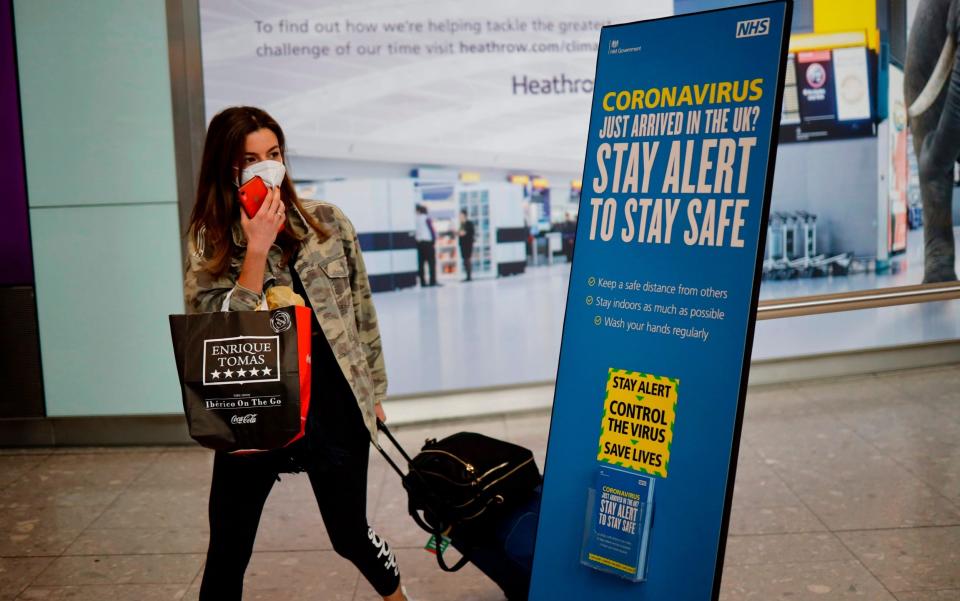Talks have begun on 'air bridges' for holidaymakers to go abroad, says Boris Johnson, but only when it is safe


Britain has opened talks to establish “travel corridors” with popular holiday destinations including Portugal, Greece and France as the European nations announced plans to open their borders and lift quarantine restrictions.
Priti Patel, the Home Secretary, said the Foreign Office was leading the bilateral talks with European countries to discuss the possibility of “air bridges” or “corridors” that would allow holidaymakers to sidestep the 14-day UK quarantine but refused to set a date for them.
Boris Johnson confirmed negotiations were underway but said international travel corridors would only be allowed “when the evidence shows that it is safe to do so.”
He would not be drawn on whether people would be able to go abroad on holiday this year.
The Government is under pressure from industry, MPs and some of the European nations to have the “travel corridors” in place by the end of June to enable holidaymakers to get a foreign summer holiday by July although it has yet to agree the criteria on which they will be determined.
The criteria is expected to include the economic importance of the country to the UK, number of passengers, amount of trade, airport health screening in place and Covid-19 “risk picture”.
Portugal's foreign minister Augusto Santos Silva confirmed yesterday that his country was in discussions with the UK, saying quarantine was “an enemy of tourism.”
Portugal, which attracts 2.1 million British tourists a year, hopes to have an agreement in place for the end of June, when the British Government has said it will review its quarantine.
“During these weeks our diplomats will work together in order to guarantee that British tourists coming to Portugal would not be subjected on their return to England to any kind of quarantine,” he said.
Italy opened its borders yesterday and wants to see the UK’s quarantine scrapped when it first comes up for review on the week beginning June 28 and expects to be at the front of the queue for any “travel corridors” or “air bridges.”
"We hope that at the end of June quarantine will be abolished," said a Government source.
"Should the UK before that date make agreements with countries to exempt their citizens from quarantine, of course we would hope to see Italy included in that list," he said.
"From today we have liberalised the possibility of flying to Italy but that's not the case for Italians flying to the UK from June 8."
Greece confirmed it will open to tourists from low-risk regions from June 15 and is in talks with Britain for a “reciprocal” arrangement whereby passengers would avoid quarantine in either country.
Greece's tourism minister Haris Theoharis said the epidemic was moving “in the right direction” in the UK and restrictions could be dropped for Britons from June 15. Although some parts of Britain would satisfy the Greek criteria, others do not yet do so.
“I would consider it a positive step if at some point the UK lifted the restrictions on visitors returning from Greece to the UK," said Mr Theoharis.

Spain is also looking to negotiate travel corridors although it has excluded Britain from a trial opening up the Balearic islands of Mallorca, Menorca, Ibiza, and Formentera by the middle of June because of the UK’s comparatively high infection rate.
Maria Reyes Maroto, the Spanish tourist minister, said: “There the health situation still has to improve. For us it is important to guarantee that people arrive healthy and leave healthy.”
A Government source added: “From July 1 in terms of who can come to Spain the key factor will be the epidemiological situation and not reciprocity in terms of quarantine. We want to agree on a set of common indicators on a European level so there is no kind of discrimination about who can travel safely.”
France, which is expecting to lift travel restrictions from EU countries on June 15, confirmed it was in discussions with the UK for a “reciprocal” deal under which neither would impose quarantine on the other. "We will apply reciprocity," said Prime Minister Edouard Philippe.
Belgium joined Germany yesterday in announcing it will reopen borders with up to 30 EU states on June 15.
However, German Foreign Minister Heiko Maas “strongly advised” against travel to the UK because of its 14-day quarantine.
In the Commons Ms Patel came under pressure from senior Tory backbenchers to accelerate negotiations so that prospective “travel corridors” could be announced in tandem with the quarantine taking effect next week.
Sir Graham Brady, chair of the powerful 1922 backbench committee, said: “We need immediate clarity about the criteria for safe countries and the names of those countries that will be the air bridges put in place rapidly.”
Tim Aldersdale, chief executive of Airlines UK, said air bridges needed to be established ideally before the Government’s review at the end of June. “If they leave it too late we run the risk of the summer season being over and losing out to other countries who are starting to open up their borders now,” he said.
Ms Patel told MPs: “It is our determination to ensure that we work with the travel industry and all carriers to find the safe way in which people can travel. That’s our priority.”

